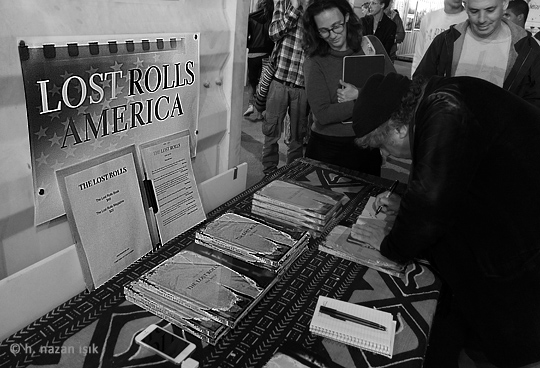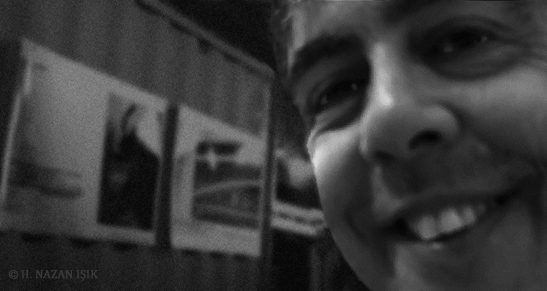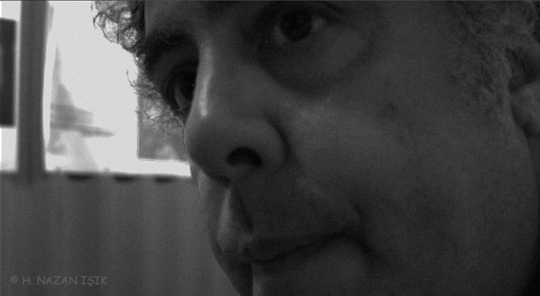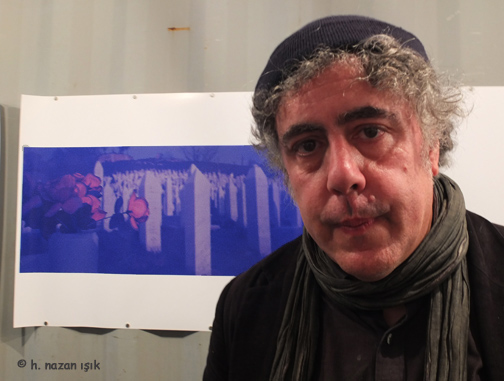h. nazan ışık—
30 September 2016—
I was at Photoville , the New York photography festival, to talk with Emmy nominated, award winning photojournalist and co-founder of the photo agency VII, Ron Haviv about his work and new book “The Lost Rolls”
H. Nazan Işık : “The Lost Rolls”. It is a very I catching title for a book and for an exhibition. How was this idea born?
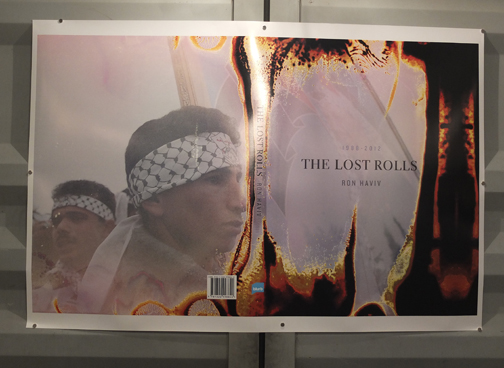 A photograph by Ron Haviv, from the “The Lost Rolls” project and the cover of “The Lost Rolls” book
A photograph by Ron Haviv, from the “The Lost Rolls” project and the cover of “The Lost Rolls” book
Ron Haviv: It was born after realizing that I had a lot of film that was exposed but undeveloped, put aside and forgotten, which I had very little idea what was on it. And I was looking for a project to work on with Blurb publishing company. I suggested to them that I had some film, they might be interested in. They agreed to have a look at them. We started with ten rolls or so. When we looked at the film “Wow! This is interesting for variety of different reasons,” they said, and they processed all the film.
HNI: Ten rolls became how many? Do you or did you date your rolls? When you saw images what shocked you the most?
RH: Ten rolls became over 200 rolls of film taken over the last 25 years. Some film was dated, was in envelopes. Maybe I shot something on …. Oh sorry, I just need to sign that book…
Mr. Haviv got up to sign a book.
It was Sunday, almost 20:30, and the last day of Photoville. There were a lot of people enjoying the nice weather, wanted to see works, meet photographers, get information and buy books if available. Mr. Haviv was so kind to sit with me, talk to me instead of spending time with his friends, guests and visitors.
He came back.
RH: Where were we? Oh yes, 10 rolls became over 200 rolls. Some film was in envelopes, which were dated. I guess I shot it on spec, and no one wanted it. So, kind of I put them somewhere. Other film had no metadata, no information. So, what I was experiencing in finding as I was looking at some of this film, I actually had no idea, I didn’t know where I was, whom I was photographing, and I didn’t know the date. And, that for me was a very much a shock.
I always thought that when I looked at my work that I can tell you what I was doing that day, at that moment, in the morning, in the afternoon, before and after the picture…everything. And I can still do that with number of images. But I realize now, if I don’t see the photograph within a certain period of time after photographing it, I lost ability to create a foundation. And when I lost that foundation, memory started to disappear. So we decided to have a look at this idea as not only to look back of my work as pictures I have never seen before, but also kind of looking into like exploration of my memory when I remembered, when I didn’t remember.
HNI: Let’s say, years ago you photograph an event, and you forgot to develop the film. Years later you found the film, but you don’t want to remember that event. Let’s assume it was a wedding, even your own wedding. He smiled….
© h. nazan ışık
Would you process that film?
HR: Yes, I still, I still…I think that I have a responsibility, if it is not for me it is for the public; I have a responsibility for the public for the images to be seen. Because I work under that relationship, that I am there as your eyes, to show what was happening. So, sometimes it takes maybe 25 years, but at some point it is important….
HNI: I interrupted him. But it is your own event, your own wedding, imagine, it ended very unpleasantly, this way or another. You don’t want to remember it at all. In fact you want to forget that event. Years later, would you still process that found film?
RH: He paused for a moment, My own personal thing…Yes, I still think it is very hard for me to break that relationship, that I think it is almost like a social contract with photograph. Once it is taken, it is meant to be seen.
HNI: Do you keep a journal? Do you keep a record of places, dates, names of people you photograph?
RH: No, I still don’t keep a journal. I am much more meticulous about noticing details, things like that. I think that by having all that information now I am able to basically do what I was intending to do. I keep a better record. I still – even though I started to be a writer- I still feel like I, kind of, would like to have that kind of not a formal relationship with images.
HNI: Almost every image on the wall is accompanied by words. Do you think narrative is necessary? Do you need words for this project, or for any project?
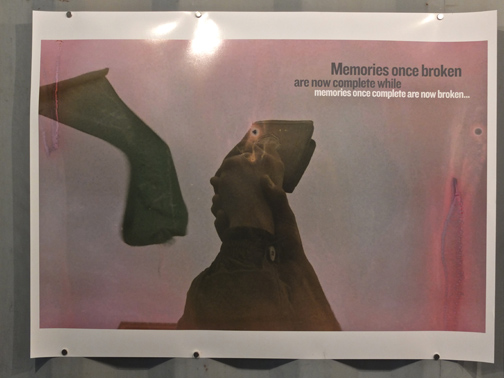 A photograph with words on the wall by © Ron Haviv
A photograph with words on the wall by © Ron Haviv
RH: I think to the point what I am trying to make with this project it is really, actually, incredibly necessary. It is really what this project is about. There are many projects about finding old film, or a lot of people saying “Oh! I found this camera with a roll of film in it, or I am collecting negatives at garage sales,” and so on. But those are different than this project.
HNI: What is this project about? Why it is different that the others?
RH: This project is about the words, my feelings, my relationship to these images, where I am today and where I was then. So, luckily obviously I am still alive and I am able to commend on that work. So, to edit and entire project is based on that. It is a very important part of it. And exactly why for the next part of the project, “Lost Rolls America”, where I really want people to write about the work, what it means to them, what they remember, or don’t remember all that. That’s I think what is important about the project.
HNI: Would you like to talk about “Lost Rolls America” project?
RH: It is a national project to create a national archive with the collection of undeveloped film from the public, and the second part of my “The Lost Rolls” project.
The degradation of physical image, the degradation of my memory, and also starting to understand the universality of this experience that many people have their own undeveloped exposed rolls of film, so photographs of family or friends that could be mine, could be yours, could be anybodies, and I sort of realized that many people no longer thought that they could get their film developed, many people were throwing away their film and it was something we should change.
So the first part of the project was “The Lost Roll” which is me looking at my work. And then realizing this universality we decided to create “Lost Rolls America” project.
And in fact, as late as two days ago I found more film. So, I keep thinking that I had found all my film I had. So I found 2 rolls of film from 1988. They now became “Lost Rolls America” project.
We ask the public to find their own lost rolls and submit them. Fujifilm will process and scan them for free and upload it to a secure website, only for your eyes. And we ask you to choose one to two images, write your personal thoughts, create a visual story about your image and upload them to the archive, and be a part of a photo book of contributors and an exhibition at the 2017 Photoville Festival in New York.
HNI: Any link that people who are interested in this project can get more information?
RH: Yes. www.lostrollsamerica.com is the link to go.
HNI: Did you have any film stock that there was no one to develop them any more?
RH: No, the closest was that I had 14 rolls of Kodachrome in this project. Kodachrome was not able to be processed as was intended. But it was still processed under the B&W process. So the image still exists, is not lost, but not exactly as I originally shot them.
HNI: Digital or film? Which one pushes you to be more careful, since you can’t see what you shot with analogue film, which one makes you push yourself to get better images?
RH: Right. I think that digital certainly allows you to be freer, because you have obviously more ability to create space and more cards so on. But at the same time I think I still am trying to be very deliberate and slow when shooting digital like I would be with film.
HNI: But do you look at your image?
RH: I do look at it often for, certainly for exposure. Then I go back to spending the time with the image. But also one of the benefits of digital is that by having an ability to look at the image, there are times I realize when I am looking at what I just shot, that actually I was wrong. Shooting is not the image but I see the image insight. Actually it becomes very helpful, but I don’t shoot one picture and look at the camera, and shoot one picture. You want to create a rhythm.
Ron Haviv, in front of one of the images from “The Lost Rolls” exhibition and book.
HNI: What is your next project?
RH: Well, I am working on this “Last Roll America”, and working on several other projects. We have a, at VII Photo, we have a very big project coming up with a book and films and an exhibition at the UN.
And I am working on a documentary also, where I am looking at my work on Panama, my photographs in Bosnia. We are going back, talking to people, to understand how those photographs became intertwined in the collected memory in history of the country.
HNI: Whom are you working with?
RH: I am working with Dr. Lauren Walsh who has an essay in “The Lost Rolls” book. We will be co-directing, sometimes I am doing camera. It is basically going back and looking, talking to people that were affected by the photograph, people in the photograph, people who knew people in the photograph, people that around the photograph and understanding how that each image, one in Latin America, one in Europe, how they become part of the history of that country.
HNI: You have been very busy, even here at Photoville you are part of three different events: walking tour of Photoville, Panel, and of course exhibiting your work, launching your “The Lost Rolls” book, and introducing “Lost Rolls America”, a national archive, project.
And also I see you will be one of the Keynote Speakers at the PDN PhotoPlus International Conference +Expo at the Javits Center.
HR: Yes, It is the 15th anniversary of VII Photo. Agency members Ashley Gilbertson, Jessica Dimmock and myself will be giving the Keynote at Expo. We are looking forward to that as well.
HNI: A last question that I ask everyone I interview: If you were a journalist what would you ask Ron Haviv?
RH: It is a great question. (A little pause…)
I really want to understand if he is really believing what he is saying. Is it really true or is it something that he got used to always being asked, know he is answering?
HNI: And your answer?
RH: Yes!
HNI: Yes to what? Yes to what part of your question?
RH: Yes, It is true, yes I believe what I am saying.
HNI: Thank you.
Let’s remind the link to your Lost Rolls America project , if you wish.
RH: Thank you.
For more information please visit www.lostrollsamerica.com
Photos: © h. nazan ışık /NKENdiKEN
© h. nazan ışık

